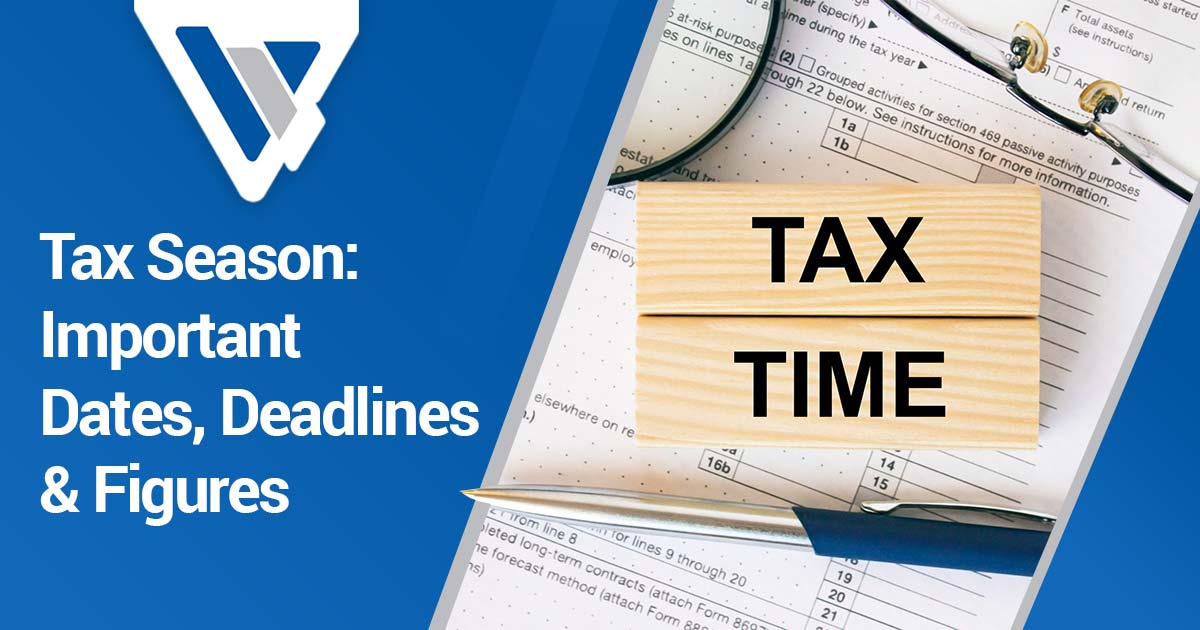I am sharing with you some of the information the Life Insurance Marketing and Research...


It’s hard to believe that tax season is here already. In an effort to help our clients be prepared, we wanted to make sure you are informed of important dates and items to consider when preparing to file your taxes.
Although the IRS pushed back the April 15 tax filing deadline last year, there has been no indication that the filing due dates will be extended again this year. However, its possible things can still change between now and April 15. If unexpected events cause a new emergency situation beyond the current status quo, the IRS certainly could react by delaying the deadline. We, Virtus Wealth Management, will continue to provide timely updates on the matter if things do change, and we are always available to answer any questions you may have either via phone or email.
While it is unlikely that the IRS is going to push back the April 15, 2021 due date, this doesn’t mean everything is guaranteed to go smoothly or that no delays will happen on the agency’s end. The IRS recently announced that it won’t begin accepting tax returns until February 12, 2021, which is notably later than in normal years. In addition, the IRS is urging taxpayers to use electronic options to insure faster processing of tax returns, refunds, and payments.
The CARES Act waved required minimum distributions (RMDs) for 2020. Even inherited IRAs, which would normally need to be liquidated within 5 years of the original account holder’s death, were not required to take a distribution in 2020 and now have an extra year to fulfill the 5-year requirement. The waved RMDs do not need to be made up or doubled in 2021, just the regularly calculated amount needs to be taken in 2021.
The SECURE Act of 2019 increased the starting age for RMDs from 70 ½ to 72, which took effect January 1, 2020. Considering both laws, if you turned 70 ½ by the end of 2019, you should resume taking RMDs in 2021. If you had not turned age 70 ½ by the end of 2019, you are not required to take your first RMD until April 1st of the year after you turn age 72.
In addition, the Secure Act repealed the age limit for contributions to traditional IRAs. Effective for 2020 and on, individuals of any age can make Traditional IRA contributions, as long as they have earned income. The combined annual contribution limit for Roth and Traditional IRAs remains the same for 2021 as it was in 2020: $6,000 ($7,000 if over the age of 50).
The CARES Act, introduced a new above-the-line deduction for charitable contributions. On your 2020 taxes, taxpayers who take the standard deduction may take an additional deduction up to $300 for cash contributions to qualified charities. For your 2020 taxes, the $300 limit applies to all filing statuses. However, starting in 2021 and permanently in effect for future years, this deduction increases to $600 for married filing joint filers and remains $300 for single taxpayers.
The CARES Act and the Consolidated Appropriations Act (CAA) (signed into law on December 27, 2020) temporarily suspended limits on charitable contribution deductions for the 2020 and 2021 tax years. The new legislation also increased the accuracy penalty from 20% to 50% for any overstatement of qualified charitable contributions, reinforcing the need for receipts and proper record retention.
Medical expenses that exceed 7.5% of your AGI are now deductible for taxpayers who itemize. This rate decreased from 10% in 2019 and is not set to change from the now permanent 7.5% rate.
Under the CAA, employers may permit extended grace periods or extended carryovers for health and dependent care flexible spending accounts (FSAs) for plan years ending in 2020 and 2021. Active participants now have until December 31, 2021 to incur expenses that may be paid for with the unused 2020 funds, without regard to the $550 limit generally imposed on FSA carryovers.
The nonbusiness energy credit that was set to expire in 2020 has been extended through 2021. This allows a credit up to $500 (lifetime cap) for qualified energy improvements of principal residences.
The LPL mailing schedule for your tax statements is listed below. In order to meet all IRS deadlines, reduce errors, and reduce the need to mail corrected versions, 1099 Consolidated statements will be mailed in four phases.
| PHASE & 2021 MAILING DATES | DESCRIPTION |
| 1 – January 29 Release | 1099-R Form Mailing First wave of 1099 Consolidated Forms Mailing Includes accounts with the simplest tax information and not subject to income reclassification |
| 2 – February 19 Release | Second wave of 1099 Consolidated Forms Mailing Includes accounts holding more complex securities that may be subject to income reclassification Preliminary 1099 Consolidated Form DRAFT COPY Includes accounts that will not receive a final 1099 Consolidated Tax Statement until March 5 or March 12 |
| 3 – March 5 Release | Third wave of 1099 Consolidated Forms Mailing In the event that investment companies do not furnish tax information to LPL in time for the February 19 mailing deadline |
| 4 – March 12 Release | Fourth wave of 1099 Consolidated Forms Mailing In the event that investment companies do not furnish tax information to LPL in time for the February 19 or March 5 mailing deadline, such as:Accounts holding securities that may be subject to income reclassification Accounts holding securities that provide mortgage-backed income reporting information (AMBIR) |
The following deadlines are for calendar year filers. The deadlines for partnerships and corporations that follow a fiscal year calendar vary, consult your tax professional for more information.
| Partnerships | March 15th
September 15th |
Deadline to file your return (IRS Form 1065) or file for an extension (IRS Form 7004)
Deadline to file your return if an extension was requested |
| S corporations | March 15th
September 15th |
Deadline to file your return (IRS Form 1120-S) or file for an extension (IRS Form 7004)
Deadline to file your return if an extension was requested |
| Trusts and Estates | April 15th
September 30th |
Deadline to file your return (IRS Form 1041) or file for an extension (IRS Form 7004)
Deadline to file your return if an extension was requested |
| Individuals | April 15th
October 15th |
Deadline to file your return (IRS Form 1040) or file for an extension (IRS Form 4868)
Deadline to file your return if an extension was requested |
| C corporations | April 15th
October 15th |
Deadline to file your return (IRS Form 1120) or file for an extension (IRS Form 7004)
Deadline to file your return if an extension was requested |
The standard deductions for 2020 federal taxes filed in 2021 are reflected in the chart below. Note the additional standard deduction applies to each spouse, so if both spouses are over the age of 65 (and not legally blind) their additional standard deduction is $2,600.
| Standard Deductions | ||
| Filing Status | 2020 | 2019 |
| Married Filing Jointly | $24,800 | $24,400 |
| Head of Household | $18,650 | $18,350 |
| Single | $12,400 | $12,200 |
| Married Filing Separately | $12,400 | $12,200 |
| Dependent | Greater of $1,100 or
$350 + earned income |
No Change |
| Additional standard deduction for the blind and filers over the age of 65 | ||
| Single & Head of Household | $1,650 | No Change |
| All others | $1,300 | No Change |
The chart below reflects the 2020 federal income tax brackets for taxes due in 2021.
| Tax Brackets | ||||
| Tax Rate | Single | Married Filing Jointly | Married Filing Separate | Head of Household |
| 10% | $0-$9,875 | $0-$19,750 | $0-$9,875 | $0-$14,100 |
| 12% | $9,876-$40,125 | $19,751-$80,250 | $9,876-$40,125 | $14,101-$53,700 |
| 22% | $40,126-$85,525 | $80,251-$171,050 | $40,126-$85,525 | $53,701-$85,500 |
| 24% | $85,526-$163,300 | $171,051-$326,600 | $85,526-$163,300 | $85,501-$163,300 |
| 32% | $163,301-$207,350 | $326,601-$414,700 | $163,301-$207,350 | $163,301-$207,350 |
| 35% | $207,351-$518,400 | $414,701-$622,050 | $207,351-$311,025 | $207,351-$518,400 |
| 37% | $518,401+ | $622,051+ | $311,026+ | $518,401+ |
Here are some important items to consider as you begin receiving your tax documents.
Schedule K-1’s are used by pass through entities and document income distributed to you during the tax year. So, you will receive a K-1 if you are a partner or shareholder in a passthrough entity (like a Master Limited Partnership). Realize, too, that you might receive a K-1 form if you are invested in a fund or an Exchange Traded Fund that operates as a partnership.
The tricky part for you with a K-1 is timing. Unlike 1099 and W-2 forms, which are due to the taxpayer by the end of January (mid-February at the latest), a K-1 isn’t due until mid-March because businesses need more time to file their tax returns.
Please be aware that you may receive a Corrected 1099 after your initial 1099 due to income reclassification. Income reclassification refers to changes that security issuer companies (such as outside banks and institutions) make to all or part of previously reported distribution income to some other tax classification. Your annual 1099 tax statement reports are received from these outside issuer companies. After issuers complete year-end audit and reporting processes, this information may change, which is referred to as income reclassification. This information is then applied to accounts that are impacted by the securities changes and a new 1099 statement is generated and mailed in the next correction mailing.
Similar to other major financial firms’ standard protocols and delivery, 1099 Consolidated statements are mailed in waves as information is received from various institutions. For certain security types, final tax information from the bank, institution, or other type of issuer may be received after the standard deadline, resulting in your statement not arriving on the anticipated February date. In these cases, the statement will be mailed on March 5 or March 12, 2021.
Tax statement corrections due to income reclassifications are more likely for certain investments including:
— Regulated investment companies (mutual funds)
— Unit investment trusts (UITs)
— Real-estate investment trusts (REITs)
— Widely-held fixed investment trusts (WHFITs)
Unfortunately, there’s no IRS cutoff or deadline for providing corrected 1099 forms. If you need to file an amended tax return, it’s recommended that you discuss the situation with your tax advisor prior to refiling so you can determine the best course of action based on your individual circumstances.
Note: Reclassification is an industry-wide activity. All financial industry firms receive reclassified data from the issuers.
It’s always a good idea for you to maintain an open line of communication with us and your tax advisor throughout the year in order to ensure appropriate tax strategies. This dialogue can help you decide if filing an extension is the best course of action. There are many reasons why filing an extension might make sense. For example, the volume of data or complexity of certain transactions inside or outside your accounts may require additional time to address. Also, if you are expecting to receive your 1099 in the fourth mailing wave in March, it may be reasonable to consider filing an extension to allow sufficient time for their tax advisor to accurately complete their tax return forms.
This information is not intended to be a substitute for specific individualized tax advice. We suggest that you discuss your specific tax issues with a qualified tax advisor.